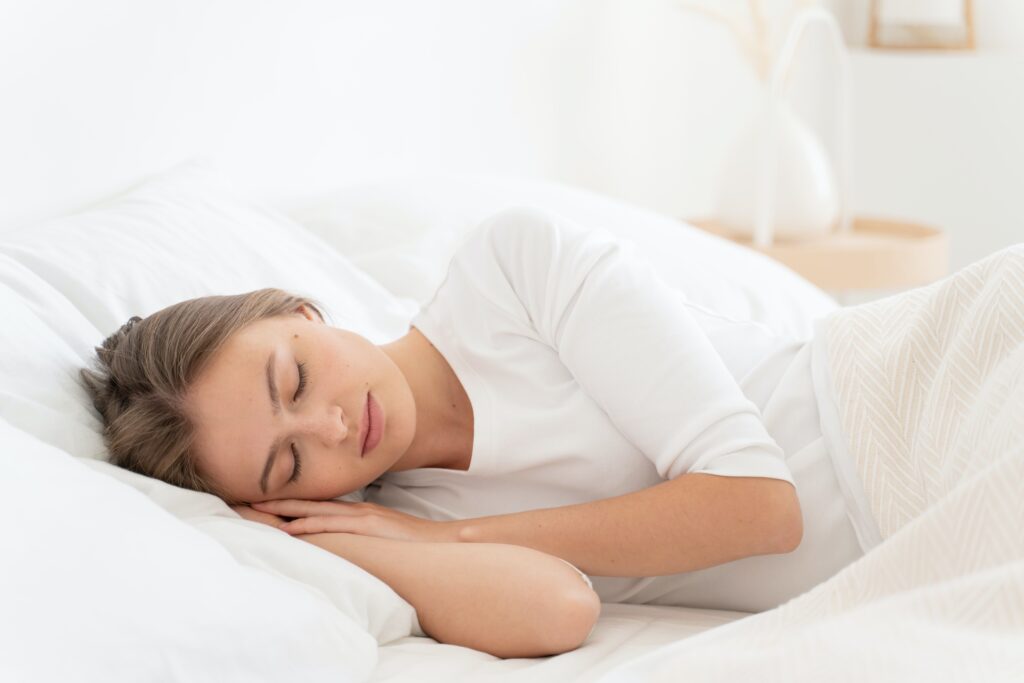Best Time to Sleep for Healthy Skin Revealed
If you want to have healthy, radiant skin, you should rethink your bedtime routine. You will start to see improvements once you discover the best time to sleep for healthy skin.

A good night’s sleep is the formula for feeling refreshed and new. But did you know it can also work wonders for your skin?
In this post, we’ll explore the connection between your sleep patterns and the health of your skin.
Let’s begin.
The Power of Beauty Sleep
Your skin’s best friend is a quality night’s sleep. Many people even refer to it as beauty sleep. That is because while you’re peacefully slumbering, your body kicks into high gear, initiating repair mode.
This includes the crucial tasks of renewing skin cells and producing collagen and elastin, the dynamic duo responsible for skin elasticity and youthful appearance. Think of them as your skin’s personal architects and builders.
But there’s more! Sleep is also a master regulator, taming inflammation and optimizing blood flow.
On the flip side, insufficient sleep can lead to unwanted skin issues like acne breakouts, redness, puffiness, and a lackluster complexion.
The Hormonal Helpers
Your body doesn’t stop there. During your nightly rest, it creates growth hormones and melatonin.
Growth hormone plays a starring role in cell regeneration and repair, while melatonin doubles as an antioxidant, shielding your skin from the harm caused by free radicals.
And guess what? Your immune system loves a good night’s sleep too. It helps your body resist infections and inflammation that could otherwise harm your skin.
By any means, it’s not just about quantity but also quality. Poor-quality sleep can cause dark circles, fine lines, and wrinkles to set up camp on your face.
Determining the best time to sleep for healthy skin can significantly help your skin.
That’s because insufficient sleep tends to crank up cortisol production, a stress hormone that can break down your skin’s collagen and elastin, which, of course, leads to premature aging. Knowing what time to go to bed will help you get enough sleep.
The Price of Sleep Deprivation
Now, there are a lot of skin troubles that sleep deprivation can unleash. Take the following as examples.
- Acne: Insufficient sleep can ramp up cortisol, which is notorious for causing acne. It can also trigger body-wide inflammation, making acne worse.
- Wrinkles and Fine Lines: Skimping on sleep means less collagen production, resulting in more pronounced wrinkles and fine lines.
- Dry Skin: Sleep deprivation can leave your skin dehydrated, causing it to flake and feel rough.
- Swollen Eyes and Dark Circles: Puffy eyes and dark circles often accompany a lack of sleep due to fluid buildup.
- Paler Skin: Inadequate sleep can lead to paler skin, mainly due to decreased blood flow.
- Rashes: Sleep-deprived? Your immune system may struggle, making you more susceptible to skin rashes and other issues.
- Dehydration: Not catching enough Zzzs can leave your skin parched and prone to problems.
In essence, skimping on sleep can invite a host of skin problems, including acne, wrinkles, dryness, puffiness, pallor, rashes, and dehydration.
To keep your skin at its prime, prioritize a good night’s sleep and respect the best time to sleep for healthy skin.
Crafting Your Ideal Sleep Schedule
Your skin’s dream schedule isn’t just about how long you sleep; it’s also about when you hit the sack. But when does your skin thrive the most?
Again, stick to your schedule. Going to bed and waking up at the same time every day helps regulate your body’s internal clock, known as your circadian rhythm, in simple terms.
Consider creating a bedtime routine and follow it. For example, going to bed at 10 pm every night, taking a warm bath before bed or reading relaxing bedtime stories for adults is a good start. Reading before bed can help you sleep faster and relax.
The golden window for bedtime to pamper your skin is about 7 to 9 hours before your wake-up time. If you need to wake up at 7 a.m., the best time to sleep for healthy skin for you would be between 10 p.m. and 12 a.m.
Your internal clock is the conductor of your sleep-wake symphony. It’s influenced by factors like light exposure, physical activity, and meal times.
Consistency in bedtime and wake-up time keeps your internal clock ticking smoothly. Listen to it.
The Circadian Rhythm, a 24-hour cycle, orchestrates many of your body’s functions, including sleep. To keep your skin happy, maintain a consistent sleep schedule to sync up your circadian rhythm.
Consistency Is Key, as you have come to grasp. But it is not only isn’t just about timing; it’s your skin’s BFF. It helps maintain your internal clock and circadian rhythm, promoting quality sleep and reducing the risk of sleep troubles.
In a nutshell, your skin’s ideal sleep schedule demands consistency. Aim for 7 to 9 hours of shut-eye within a regular sleep routine.
Doing so keeps your internal clock and circadian rhythm in harmony, benefiting your sleep quality and your skin’s health.
Skin Love Through Sleep Hygiene
Ensuring your skin’s well-being requires more than just a comfy pillow. Sleep hygiene is the magic wand that keeps your skin youthful and glowing.
Your skin loves a boost of collagen. Use a moisturizer with hyaluronic acid before bed to hydrate and plump your skin while you sleep.
Ever heard of a silk pillowcase? It minimizes friction, reducing wrinkles and creases as you slumber.
Make sure to clear away the day’s dirt, oil, and makeup from your skin before bedtime. It prevents clogged pores and breakouts. A gentle cleanser can also leave your skin feeling soft – pamper your pores even further with the finishing touches of an organic cotton pad soaked in your favourite toner.
And, of course, if you haven’t started already, pamper your skin with a routine that includes moisturizing and sun protection. Moisturizing keeps your skin supple, while sunscreen shields it from harmful UV rays.
The Bigger Picture: Lifestyle and Environment
Your lifestyle and environment are your skin’s worst enemy or best ally. Stress can aggravate skin problems like acne and eczema due to increased inflammation.
Prioritizing good sleep and mental health is vital for vibrant skin, and sun protection is a must to prevent damage.
Seek guidance from dermatologists or doctors if you’re dealing with skin concerns such as acne or psoriasis. They can diagnose and provide effective treatments.
Consider a healthy lifestyle. Pay attention to your eating habits, water intake and how much exercise you are getting during the day. It can be the solution to your skin looking young and healthy.
Antioxidant-rich skincare products will protect your skin from pollution, free radicals, and sun exposure. Start using them.
Are you a smoker? Consider quitting to regain your skin’s natural glow. Finally, caffeine can help with under-eye circles, and retinol is excellent for reducing fine lines and wrinkles.
Maintain a healthy weight. Monitoring your weight will prevent skin issues. So, take care of yourself, and your skin will thank you!
Last Thoughts
Ultimately, it all boils down to one key priority: getting lots of sleep and knowing what time to go to sleep helps a lot.
Both you and your skin deserve that revitalizing, restorative benefit that comes bundled with a peaceful night’s slumber.
Aim for a solid 7-9 hours of high-quality sleep every night. And hey, your skin would totally appreciate a moisturizer decked out with hyaluronic acid.
Here’s a nifty tip: snooze on your back to ward off those sneaky wrinkles, plus treat yourself to a silky pillowcase to keep skin friction at bay.
Now, let’s not forget the importance of sticking to a regular sleep schedule, practicing stellar sleep hygiene, and keeping a watchful eye on your overall lifestyle and surroundings.
Stress levels, the magic of beauty sleep, diligent sun safeguarding, and a generally healthy way of life—all bear heavy influence on your skin’s overall well-being.
Lastly, remember that age is but a number when we chat about the sleep-skin connection.






